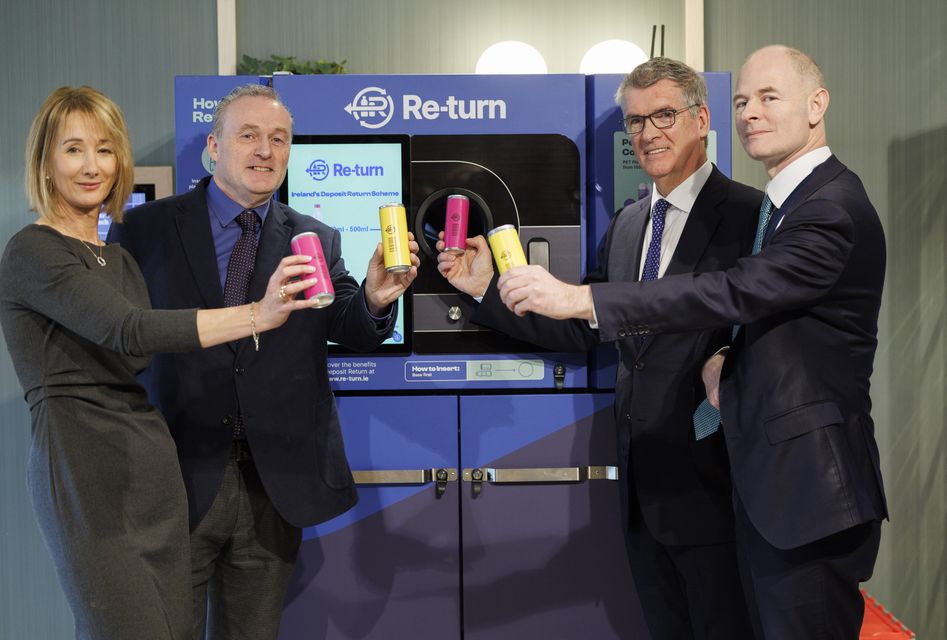Ireland’s Deposit Return Scheme (DRS) is reaching the end of its four-month transition period. From Saturday, any PET bottle or aluminium can from 150ml to three litres bought from a retailer should now display a Re-turn logo.
It has been 17 weeks since the scheme went live, requiring a significant shift in deeply ingrained behaviours. We asked consumers, retailers and producers to navigate new infrastructure that is unfamiliar to many of us.
Was it ever going to be easy? No. And we are very aware of that, but we have made substantial progress, and the ongoing effort will undoubtedly be worth it.
We’ve made tremendous progress so far. The response from the Irish people has been for the most part positive, and we’re seeing good growth in scheme participation numbers.
Ireland’s average daily collection rate for May was 2.5 million – and that is up from 1.6 million in April and significantly higher than the 645,000 collected in March and 69,000 in February. In fact, we’re now seeing more containers being returned through the scheme every single day than we saw in the entire month of February.
In the week of May 20–26, there were 18.9m containers returned
Our weekly tonnage continues to rise, with the last full week (May 20–26) seeing 18.9 million containers returned. Notably, we achieved back-to-back days of over three million returns for the first time in the process on Saturday, May 25, and Sunday, May 26.
We continue to grow on a weekly basis, and that’s exactly where we want to be. The people of Ireland have spoken, and they have shown their willingness to embrace this scheme in order to build a more sustainable future.
However, it’s fair to say that for some, it’s been challenging.
There have been operational hurdles impacting both retailers and consumers. As the CEO of Re-turn, I acknowledge these. I am conscious of the frustration they have caused, and I am committed to working them through.
For the most part, issues are now in the small minority, with hundreds of thousands of people returning millions of bottles and cans every day.
Acknowledging and addressing the issues at hand is crucial, but it’s equally important to acknowledge the progress made in the context of this major infrastructural and behavioural shift.
We’re making significant headway. Our collective patience and perseverance will undoubtedly pave the way for a more sustainable and environmentally conscious Ireland.
The next phase of the programme is particularly exciting.
We are poised to deepen our engagement with communities and charities across Ireland, rallying organisations such as GAA clubs, schools, and scout dens to participate.
Re-Turn CEO Ciaran Foley
This not only expands the scheme’s reach, but also offers these groups an alternative way to fundraise and support this circular economy initiative through their recycling efforts.
But the Deposit Return Scheme doesn’t transform everything overnight.
It takes months to settle and years to fully optimise a system. We’re adopting this approach because simply placing valuable materials like plastic and aluminium in general recycling is both unsustainable and outdated by EU standards.
This brings me to an appeal to those who continue to use the traditional recycling bin for their cans and bottles – I urge you to reconsider.
The days of putting your cans and bottles into the general recycling bin and considering it best practice are behind us.
Under our old system, approximately 55pc of plastic bottles and cans were collected for recycling – which of course meant that more than 45pc were not collected. This left millions of bottles and cans on our streets and beaches, in our rivers, or going unrecycled.
Over time, the Deposit Return Scheme aims to collect and recycle 90pc of all bottles and cans, ensuring they are processed properly.
By removing these high-value items from the mixed recycling bin, the DRS promotes higher quality recycled material through separate collection and prevents cross-contamination.
Placing bottles and cans in the mixed recycling bin is now wasteful; it’s also essentially throwing away money that could be better used to help others. Re-turn is not-for-profit and we do not want unclaimed deposits.
With continued support and participation, we stand on the brink of a significant advancement in our environmental efforts – the establishment of our own recycling plant on the island.
From left, Niamh Kelly, Ciaran Foley and Tony Keohane of Re-turn with junior minister Ossian Smyth. Photo: Andres Poveda
Once we reach the recycling milestone of 15,000 tonnes of PET plastic and aluminium recycled annually all in one place (which is a rate of approximately 60pc), it will become financially viable to establish a dedicated recycling plant on the island.
This will enable us to process cans and bottles locally, thereby eliminating the need to send them overseas for recycling.
Each returned container is a step towards a cleaner Ireland and a building block towards the goal of on-island recycling. It embodies a broader vision for a sustainable future where empty drinks containers are seen as a valuable resource rather than as refuse.
The journey of the DRS, while not without its challenges, is one of huge potential and promise. We extend our deepest thanks to all who have embraced this initiative. Your patience, engagement, and commitment are invaluable as we navigate these early days.
Together, we are not just participating in a recycling scheme; we are part of a pivotal moment in Ireland’s environmental history.
Ciaran Foley is chief executive of Re-Turn, which operates Ireland’s Deposit Return Schemer collective patience will pave the way for a more sustainable Ireland

